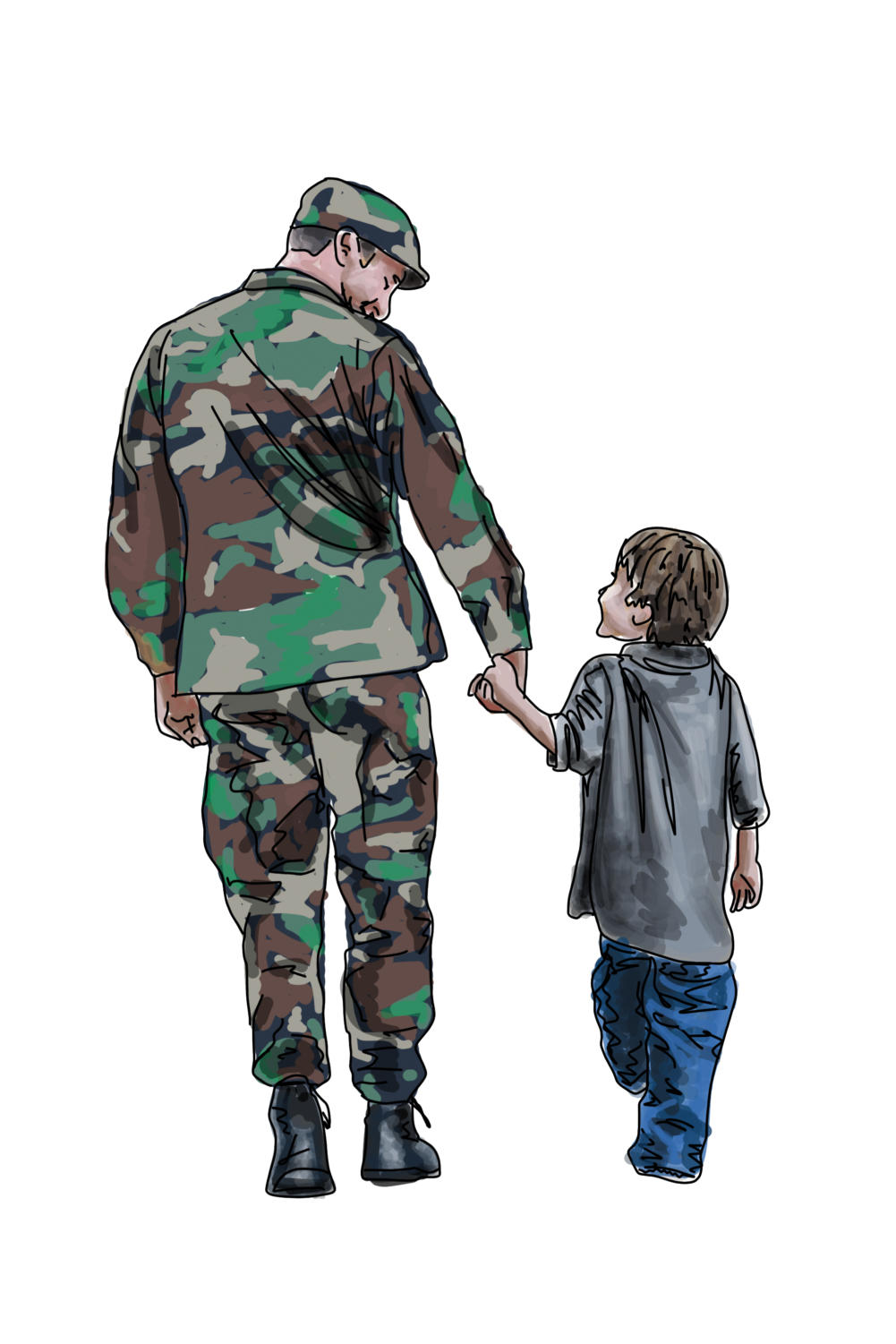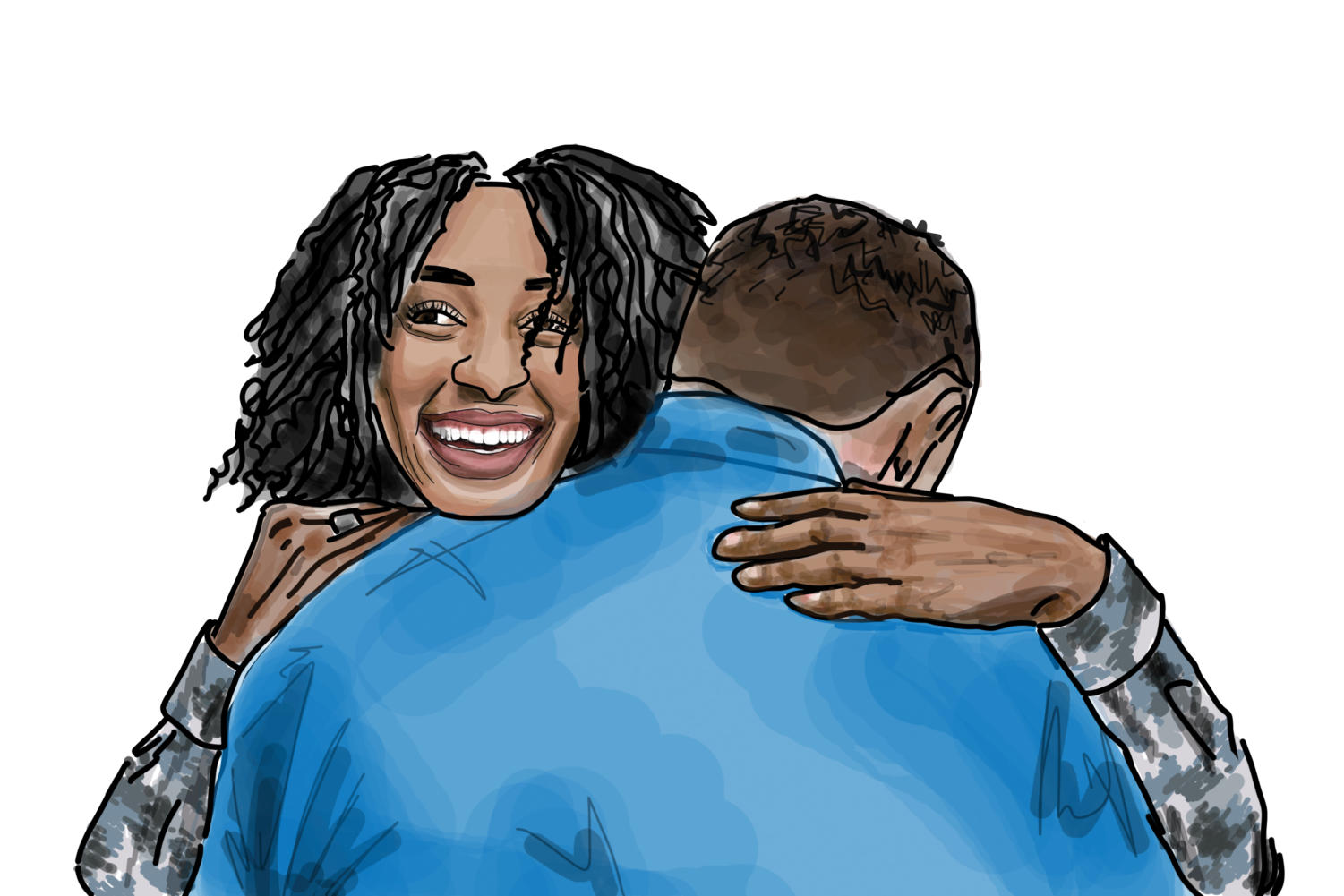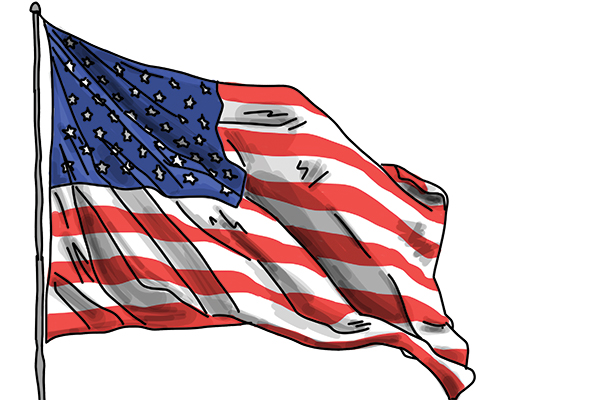The Heroes Back Home
Serving in the United States Army is considered to be one of our country’s most honorable and patriotic undertakings. More than two million men and women serve in the force, leaving three million husbands, wives, sons, daughters and parents waiting at home. In Silicon Valley, this path of duty is not as common; many fail to realize the everyday emotional adversities these family members face, no matter where in the world their loved ones are deployed. While it is typical for stories to focus on the heroes who serve, C Magazine has shifted the camera onto the people closest to them. These are the voices of the spouses, siblings and children of those who make sacrifices every day to fight for our country.

A Daughter
For many children whose parents serve in the military, intermittent time spent without their mothers and fathers is normal. During most of their childhood they are unable to register the gravity of their parent’s sacrifice because for them it is all they have ever known. This, however, does not numb the heartache that is felt every time they watch their parent depart, unaware of the next time they will be able to see them. Staff writer Jaime Furlong spoke with Paly junior Teagan Felt whose father, Stephen Felt, served in the army for 14 years, discharged as Lieutenant Colonel.
JF: How long did your dad serve in the army?
TF: My dad served in the army for 13 years, starting in 1992 and being discharged in 2006. He originally signed up to help pay for college.
JF: Where did your family move to?
TF: We moved to Egypt because he was stationed there to prevent and control the disease spread during the Iraq war.
JF: What is the longest you would go without seeing him?
TF: When we lived in Egypt he would leave for about a month at a time.
JF: How about speaking to him on the phone?
TF: I would get to talk on the phone with him about once a week, but not always.
JF: What was life like in Egypt?
TF: I went to an all-American school called Cairo American College (CAC) which started in kindergarten and went through high school. That’s where all military kids went and children of diplomats; I went to school with the Egyptian President’s nephew. At school I had a lot of American friends and Egyptian friends as well. Since I was so young everything I experienced was normal to me. In Egypt, there were guards on every street corner holding big guns. There was also a lot of poverty as it’s a third world country, so there were stray dogs and cats everywhere.
JF: How did you feel when your dad got deployed?
TF: My dad was in the army years before I was born so growing up I didn’t know anything else, I was used to him leaving. I was always sad when he left, but I always threw a party when he came back.
JF: Do you feel like your dad missed out on a part of your childhood?
TF: I feel like there are things that my dad missed out on, but for the most part he didn’t miss a lot. He made a big effort to be there as much as he could and he was never deployed for months on end, but for periods of weeks.
JF: What was life like when your dad was gone?
TF: It was normal to me when he was gone because ever since I was born that’s what my life was like.
JF: Did you ever wonder if you wouldn’t see your dad again?
TF: I was too young to really understand that he was risking his life and being put into war, so I never feared it when it was happening. Now that I’m older I realized what he was being surrounded by, and it’s scary to think that he could not have come home at any point in his years of service.
JF: What are the positives and negatives of your dad’s service?
TF: I think my dad’s service gave my family a lot of opportunities as it allowed my dad to continue his education and eventually become a professor and researcher at Stanford. It also allowed us to move to new places and have new experiences like moving to Egypt. A lot of people, when they hear I had to move around a lot when I was younger, think that it would suck, but I loved it as I got to see new parts of the world.

A Wife
Being a husband or wife to those who serve requires grace and endurance. Every military spouse has a story to tell and has made countless sacrifices along the way. Living oceans apart with limited communication poses emotional challenges to many adapting to a life independent of one’s partner. Each day, military spouses everywhere are working hard, many in single-parent situations, finding a way to make their careers fit with their unusual lifestyles. Staff writer Leon Lau spoke with Kristen Yen about her experience as a wife to former US Army officer Will Yen.
LL: How long has your spouse served?
KY: Six years, he finished in 1999. He actually decided to join the military after he completed his master’s degree. I supported him and it was something he wanted to do and he felt like he needed to do so he signed up. He went through basic training, as anyone would if they were going into the military, but because he had a college degree he went directly into being a officer.
LL: What division has your spouse served in?
KY: 500th Military Intelligence Brigade in the US Army.
LL: When is the longest you have gone without seeing/speaking to your spouse?
KY: When he was deployed, I did not get to talk with him over the phone since he was in locations where he was unable to contact me. The deployments were about 2 months long.
LL: What kind of feelings have you felt when your spouse was deployed?
KY: I was very proud of him and the work that he was doing. I missed [him] greatly when he was deployed but our time apart during those times, pales in comparison to loss of loved ones that other military spouses have experienced.
LL: What is life like while your spouse is deployed?
KY: I was attending a graduate program, so I was able to focus fully on my studies. It’s not like I didn’t miss him, I had plenty to do on my own, I had my own things that I was focusing on.
LL: What are the positives about your spouse’s service from your perspective?
KY: His parents were immigrants and he felt that the United States had given so much to his parents and he wanted to return something back to the US. In my perspective, when he joined the military he ended up growing up a lot; it tossed him a lot of responsibility, and by going in as a officer, by default he become a leader. For me, it was really cool that he got the opportunity to do such a thing that would benefit more than just the families who lost someone in a war or even benefit to villagers who are also affected by the war.
LL: What are the negatives about your spouse’s service from your perspective?
KY: One of the disadvantages of the military is that it doesn’t facilitate [a career] for a spouse.
A Brother
Siblings play a unique role in one another’s lives as their shared childhood forms their companionship. This bond is thought to be one of the strongest and most important in one’s life. Each year, millions of Americans part with their brothers and sisters as they leave to join the U.S. Military. No matter how unjustifiable, the uncertainty of their return fosters a lingering sense of angst, as the thought of losing the lives and therefore camaraderie of brotherhood and sisterhood is painful. Staff writer Ellie Fitton spoke with John Christopherson about his experience as an older brother to Joe Christopherson, a member of the U.S. Army.
EF: Who in your family serves in the military and for how long have they been serving?
JC: My younger brother Joe is a First Lieutenant in the Army. He’s been serving for about two years now. He did ROTC (Reserve Officers’ Training Corps) at Gonzaga so even though he’s only been active for a few years, it feels like it’s been longer.
EF: How often do you typically get to see him and what kind of emotions do you feel when he is away and when you see him again after a long period of time?
JC: He’s stationed out in Colorado so I only get to see him a few weeks out of the year. It’s usually five days or so around Christmas, and then another week here and there for big family events or when he gets leave. The time when he is home is really special. We have a big family but everyone clears their schedules when he’s home so we can all hang out together. The hardest part of it all is when he’s away and everyone in our family is together hanging out. Someone at some point will make the comment that they wish Joe was home. If he’s not out in the field, we definitely call or FaceTime with him just to keep in touch and stay connected. It’s kind of a “catch 22” though because the pride he has in what he’s doing and the pride I have in him for everything he’s doing is huge. It makes the sadness when he’s gone seem easier.
EF: How old was he when he started serving and how old were you?
JC: Joe was right out of college, so, probably 22. I was 25.
EF: Was everyone in your family always supportive of his decision or did it take some convincing?
JC: Everyone has always been supportive. We all knew how important it was to him and that was most important. Initially, it was more worrisome, just because everything was new and you are aware of the possible dangers. As he progressed through ROTC and his training after college, we quickly realized how well trained and knowledgeable the members of the Army are and that eased any of my fears. Even as he gets closer to a possible deployment, I’m beginning to understand that this is their job and they know how to do it safely…or as safe as possible.

Illustrations by Hannah Li






